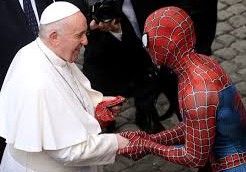
Ten Years of a Religious “Rock Star”
I’ve often read or observed media reports of huge crowds that turn out for rock stars and other popular celebrities, wondering if that could ever happen to a religious leader.
I read that “Swifties,” for instance, the name given to followers of super star Taylor Swift, turn out in incredible numbers for her performances. In June, she drew about 73,000 people to a stadium in Pittsburgh, breaking the facility’s attendance record. In April, she drew crowds of over 62,000 on three successive nights at another venue.
Then I saw the news reports on Pope Francis’ recent visit to Portugal. The pontiff, who is 86 years old, drew 800,000 people – mostly young people attending World Youth Day – to one event. Then, he drew an estimated 1.5 million people, “braving a relentlessly scorching sun,” according to CNN, packing a Lisbon park for a “Way of the Cross” event.
Many Parts of the World
The same thing has happened in many parts of the world this pope has visited. What accounts for his popularity, even among the young, who are said to have rejected religion, including Catholicism?
I believe there are several factors. First, Pope Francis, despite the fact that he wears the trappings of a medieval sovereign and lives in a strange independent mini state, comes across as genuine. And, unlikely given his power and popularity, humble.
In a famous airplane interview, returning from another World Youth Day event in Brazil, the Pope was asked about a “gay lobby” in the Vatican. His famous response, about gays in general, was, “Who Am I to Judge?” He went on to add that gay people “shouldn’t be marginalized. The tendency (to homosexuality) is not the problem … they’re our brothers.”
Fire Storm
Those five words on the plane caused a fire storm among some Catholics who believed the Pope intended to change church doctrine on homosexuality. Francis, who has now been pope for 10 years, has not done so, but has continued to insist that gay people deserve love and respect, and that they should not be discriminated against.
He isn’t afraid to say what he believes, but he doesn’t fit the mold of church leaders who appear to have all the answers. He has often met with cynics, atheists and agnostics, telling them that God loves them.
I know, this shouldn’t be exceptional for a Christian leader, but given the history of Christianity – a mixed bag of heroism, indifference and cowardice – it is extraordinary.
However, I believe we have unrealistic expectations of religious leaders. Yes, they talk about the divine, but they are human. The many allegations of sexual abuse against Catholic clergy should have disabused us of the idea that they are somewhere near divine, but I don’t think it has.
Religious leaders, like the rest of us, have foibles, temptations, character flaws, and weaknesses. In the language of religion (that has become unstylish even among religious people), they are sinners like the rest of us.
A Form of Lying?
We are quick to accuse them of hypocrisy, but I don’t believe that is the appropriate word if we’re talking about people who have high standards but fail to achieve them. In my view, hypocrisy should be applied to people who say they believe something but really don’t. Hypocrisy, in my view, is a form of lying.
If Pope Francis is in that later category, he is a terrific actor. I think he is a gift of the Holy Spirit, not just to the Catholic Church but to all people of faith and the world in general. For people searching for God, in particular, he is a beacon of faith, hope and love.
He may not be a rock star, but in this age of dashed hopes, despair, disillusionment and unbelief, his popularity shouldn’t be a surprise.



